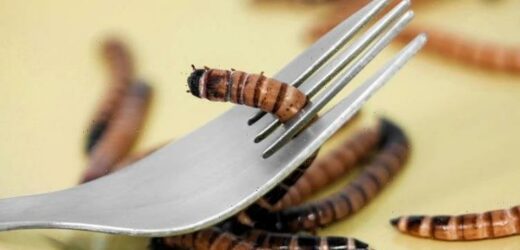Holly Willoughby GAGS after Philip eats a waterbug
When you subscribe we will use the information you provide to send you these newsletters. Sometimes they’ll include recommendations for other related newsletters or services we offer. Our Privacy Notice explains more about how we use your data, and your rights. You can unsubscribe at any time.
Scientists have proposed the radical new menu as a means of tackling poor diets and malnourishment – and the key is sustainability. Foods like mealworms, algae and fungi can be mass produced without putting a strain on the environment. And with the threat of climate change, epidemics and environmental disasters looming over the planet, scientists are scrambling to find ways in which food supply chains can be future-proofed.
Scientists from the University of Cambridge have now proposed a number of unappealing but sustainable food sources that include the larvae of the common housefly.
The researchers have also suggested farming algae like spirulina and sugar kelp, as well as mycoprotein, which is derived from fungi.
And to help the meals go down, the researchers suggested turning the ingredients into more easily digestible foods like burgers, pasta and energy bars.
The findings were presented today (May 13) in the journal Nature Food.
According to the report, these mass-produced ingredients offer a more sustainable and greener alternative to the plant and animal based food of today.
Dr Asaf Tzachor, from the Centre for the Study of Existential Risk (CSER) at the University of Cambridge, said: “Foods like sugar kelp, flies, mealworm and single-celled algae, such as chlorella, have the potential to provide healthy, risk-resilient diets that can address malnutrition around the world.”
He added: “Our current food system is vulnerable. It’s exposed to a litany of risks – floods and frosts, droughts and dry spells, pathogens and parasites – which marginal improvements in productivity won’t change.
“To future-proof our food supply we need to integrate completely new ways of farming into the current system.”
Although the idea may seem unappealing at first, it is not entirely unheard of.
The insect farm putting crickets on the menu
Just three years ago, a market in Germany made the headlines after offering a burger made entirely out of mealworms.
Served in a traditional bun with lettuce and tomato, the burger received rave reviews with one customer saying “it tasted so good”.
A hotelier in Argyll has also shared his plans to feed customers burgers made entirely out of midges – an ingredient that is plentiful in Scotland.
And five years ago, a Channel 4 programme called, Superfoods – the real story, also made an argument in favour of insect-based superfoods of the future.
The Cambridge researchers have now analysed nearly 500 scientific papers, analysing different ways in which “future foods” can be made.
They believe insects and algae can revolutionise the way food systems operate and in a way that will benefit the planet.
The researchers believe these foods can be made in unconventional environments, such as big cities or remote islands.
At the same time, they argued against conventional farming and supply chains that can be disrupted by pandemics, pests and environmental disasters.
The COVID-19 crisis, for example, has highlighted the disruption disease can bring to food production.
Other examples include the threat of locust infestations in Africa, as well as outbreaks of swine fever in Asia and Europe.
Catherine Richards, a doctoral researcher at Cambridge’s Centre for the Study of Existential Risk and Department of Engineering, said: “Advances in technology open up many possibilities for alternative food supply systems that are more risk-resilient, and can efficiently supply sustainable nutrition to billions of people.”
She added: “The coronavirus pandemic is just one example of increasing threats to our globalised food system.
“Diversifying our diet with these future foods will be important in achieving food security for all.”
Source: Read Full Article






